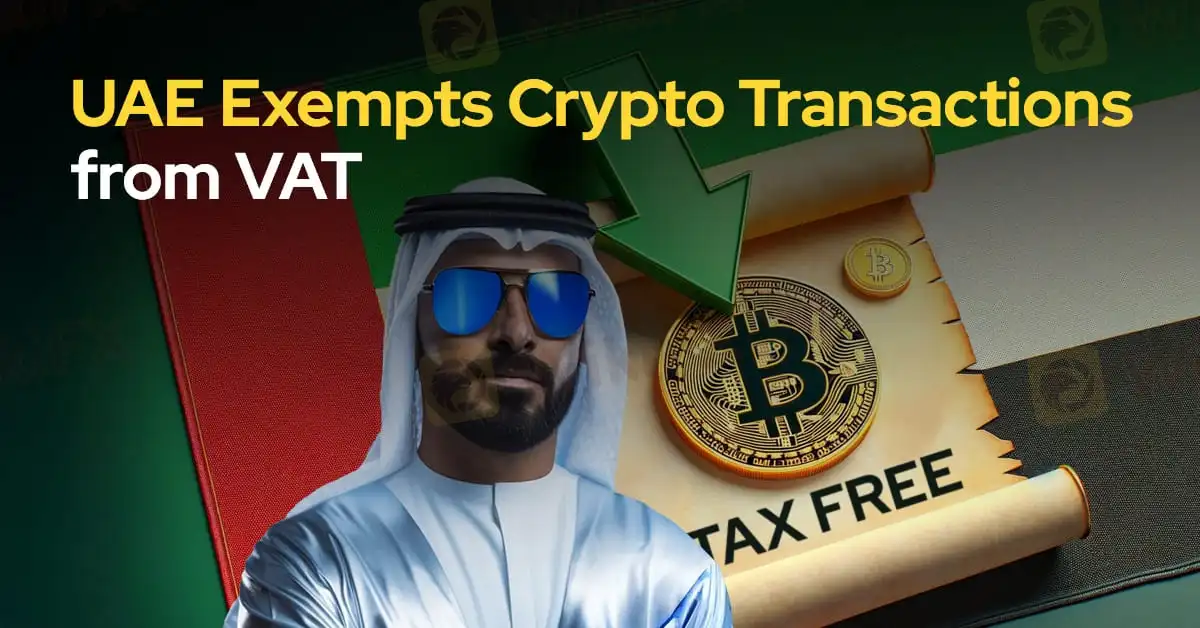简体中文
繁體中文
English
Pусский
日本語
ภาษาไทย
Tiếng Việt
Bahasa Indonesia
Español
हिन्दी
Filippiiniläinen
Français
Deutsch
Português
Türkçe
한국어
العربية
UAE Exempts Crypto Transactions from VAT
Abstract:The United Arab Emirates (UAE) has introduced a significant regulatory change by exempting all cryptocurrency transactions from value-added tax (VAT), positioning digital assets on par with traditional financial services. This new tax exemption, which takes effect on 15th November 2024.

The United Arab Emirates (UAE) has introduced a significant regulatory change by exempting all cryptocurrency transactions from value-added tax (VAT), positioning digital assets on par with traditional financial services. This new tax exemption, which takes effect on 15th November 2024, is seen as part of the countrys broader strategy to create a clear regulatory framework for the cryptocurrency sector.
The Federal Tax Authority (FTA) made the announcement, with the Arabic version being released on October 2 and the English translation following on October 4. By eliminating the standard 5% VAT on cryptocurrency-related transactions, the UAE government aims to facilitate the adoption and integration of digital assets. This exemption covers a wide range of activities, including the exchange and transfer of digital assets, effectively making all cryptocurrency conversions and ownership transfers VAT-free.

The FTA clarified that virtual assets are defined as digital representations of value that can be used for trading or investment, distinguishing them from fiat currencies and financial securities. With this update, the country has officially categorized virtual assets under a VAT-free status, providing clarity to businesses and investors alike.
One notable aspect of the new regulations is their retrospective application. The exemption applies to transactions dating back to January 1, 2018, meaning businesses involved in cryptocurrency will need to reassess their VAT obligations from the past several years. With the retrospective adjustment in place, firms that have previously accounted for VAT on crypto transactions can now expect some relief.
This move comes as part of the UAEs wider ambition to establish itself as a regional leader in digital finance and blockchain technology. By exempting cryptocurrency transactions from VAT, the government is taking a proactive step to encourage innovation and investment in this rapidly evolving sector. The country has consistently introduced policies to make itself more attractive to crypto businesses and professionals, bolstering its reputation as a favourable destination for tech and financial innovation.
Recent reports underscore the UAEs growing prominence as a global technology hub. According to research by Capital.com, 81% of tech professionals from Asia view the UAE as a key destination for technological advancement. The study, which surveyed experts from countries such as Singapore, Hong Kong, Vietnam, and India, revealed that nearly half of the respondents expressed a willingness to relocate to the UAE, surpassing traditional tech hubs like Germany and Hong Kong.
The UAE‘s appeal stems from its favourable government policies and a supportive environment for tech development. According to the survey, 76% of respondents acknowledged the country’s efforts to create an ecosystem conducive to technological growth, particularly in the realms of digital finance and blockchain. With these new VAT exemptions in place, the UAE continues to strengthen its position as a global leader in the tech and cryptocurrency sectors.

Disclaimer:
The views in this article only represent the author's personal views, and do not constitute investment advice on this platform. This platform does not guarantee the accuracy, completeness and timeliness of the information in the article, and will not be liable for any loss caused by the use of or reliance on the information in the article.
Read more

How to Automate Forex and Crypto Trading for Better Profits
Find out how automating Forex and crypto trading is changing the game. Explore the tools, strategies, and steps traders use to save time and maximize profits.

Kraken Offers $105 Fee Credit for FTX Fund Recipients
Kraken offers $105 in trading fee credits to FTX fund recipients, enabling $50,000 in crypto trading on Kraken Pro with zero fees. Secure your funds today!

Standard Chartered Secures EU Crypto License in Luxembourg
Standard Chartered secures Luxembourg crypto license, focusing on Bitcoin and Ethereum custody services as it expands digital asset solutions across the EU.

U.S. to Auction $6.5 Billion in Bitcoin in 2025
The U.S. government plans to auction $6.5 billion in Bitcoin seized from Silk Road in 2025. Analysts debate market impact as BTC prices show mixed reactions.
WikiFX Broker
Latest News
Good News Malaysia: Ready for 5% GDP Growth in 2025!
How to Automate Forex and Crypto Trading for Better Profits
Is the stronger dollar a threat to oil prices?
Rising Risk of Japan Intervening in the Yen's Exchange Rate
Standard Chartered Secures EU Crypto License in Luxembourg
How Far Will the Bond Market Decline?
U.S. to Auction $6.5 Billion in Bitcoin in 2025
Trading Lessons Inspired by Squid Game
Is Infinox a Safe Broker?
How Did the Dollar Become the "Dominant Currency"?
Currency Calculator






